|
|
|
Sort Order |
|
|
|
Items / Page
|
|
|
|
|
|
|
| Srl | Item |
| 1 |
ID:
177891
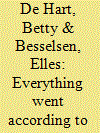

|
|
|
|
|
| Summary/Abstract |
Academic literature has studied the legal consciousness of common citizens: the way ordinary people think and talk about law in their everyday lives. Building on this literature, we explore how Dutch female citizens with a migrant partner experience the impact of migration law on their everyday lives. We questioned how legal consciousness is linked to intimate citizenship, thus demonstrating how ‘private’ matters such as intimate relationships, marriage, and family have a profound impact on citizenship. Based on two sets of interviews, conducted in 2000 and 2016, we were able to determine how these women, despite being citizens formally, experienced the profound impact of increasingly restrictive family reunification policies. Contrary to our expectations, female sponsors continued to express considerable support for restrictive migration law. In performing intimate citizenship, they claimed an exception from the strict application of the rules for their particular family situation, rather than radical change.
|
|
|
|
|
|
|
|
|
|
|
|
|
|
|
|
| 2 |
ID:
177893
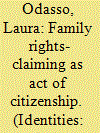

|
|
|
|
|
| Summary/Abstract |
Ethnographic and biographical research conducted with mixed-status couples and non-governmental organisations in France and Belgium provides insights into how the citizen partners of mixed-status relationships define and assert their family rights. In response to injustices suffered, from the state or from the migrant (non-citizen) partner, these citizens turned to organisations with contrasting discourses on marriage migration. These organisations encouraged them to participate in collective actions, and to give voice to their intimate experiences. Drawing on accounts of ‘intimate citizenship’, this article explores the citizenship-belonging nexus through lenses of performativity and intersectionality. Gender and ethnicity interact to influence interactions between citizen partners and the state, the tension between their virtual and actual social identities, and – ultimately – their assertions of citizenship, with personal status underpinning public claims. By speaking and acting in the name of their private lives and choices, these citizen partners affirm their (intimate) citizenship through its public performance.
|
|
|
|
|
|
|
|
|
|
|
|
|
|
|
|
| 3 |
ID:
177892
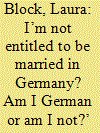

|
|
|
|
|
| Summary/Abstract |
The state interferes with the intimate spheres of families and couples via family migration policies, which have grown increasingly restrictive in many European countries. Mixed-status couples engaging in spousal migration develop coping strategies in order to adapt to hurdles and overcome them. This article explores the under-researched perspectives of sponsor spouses on (family) migration policies. When interacting with authorities, politicians or counselling services, the sponsors often react discursively, using arguments relating to human rights, citizenship, membership as well as gender and marriage/family norms. Based on a qualitative analysis of case dossiers of a German NGO counselling mixed-status couples, the article explores the narratives and strategies developed by the (mostly White) German citizen sponsors, thereby analysing the ways they ‘perform citizenship’ at the crossroads of migration control, marriage and family norms, and membership.
|
|
|
|
|
|
|
|
|
|
|
|
|
|
|
|
| 4 |
ID:
177895


|
|
|
|
|
| Summary/Abstract |
This paper analyzes intercultural issues in marriages between Japanese men and women from former Soviet Union countries. Focusing on the differences in meanings and assumptions that guide couples in their marriages and the historical-cultural roots of these differences, the paper argues that spouses adapt, negotiate, and change their expectations to each other in response to the cultural encounters that deviate from their familiar cultural patterns. The data for the research was collected by the author between 2006 and 2014 in urban areas of Japan. It consists in-depth interviews with Russian-speaking women (48) and Japanese men (20), participant observation in couples’ homes, women’s gatherings, and communication in an online Russian-language community. The analysis reveals the effects of cultural differences on relationships between spouses in international marriages in Japan, discusses the fluidity and change of cultural notions over time, and explains how spouses justify these changes.
|
|
|
|
|
|
|
|
|
|
|
|
|
|
|
|
| 5 |
ID:
177889
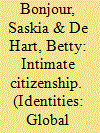

|
|
|
|
|
| Summary/Abstract |
This special issue investigates citizenship and belonging in mixed-status families, i.e. families consisting of both citizens and non-citizens. We critique the standard perception of citizenship as ‘hard on the outside and soft on the inside’. For citizens with non-citizen family members, the exclusionary nature of citizenship is very much ‘inside’, in the very heart of their families. We deploy the concept of ‘performing intimate citizenship’ to understand how citizens deal with migration regulations that hinder them from living with their families. Often this is a first, shocking confrontation with state intervention into their private lives. Protesting such interventions – in court, in collective mobilisation, in letters to the authorities – involves making claims both about who belongs and about what ‘proper’ family is. Thus, citizens and their non-citizen family members ‘perform intimate citizenship’: they express what citizenship is and should be, by mobilising intersecting conceptions of intimacy and of belonging.
|
|
|
|
|
|
|
|
|
|
|
|
|
|
|
|
| 6 |
ID:
177890
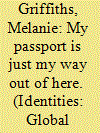

|
|
|
|
|
| Summary/Abstract |
In a context of sustained political attempts to reduce immigration and increase expulsions from the UK, mixed-immigration status relationships between citizens and precarious foreign nationals have arisen as key sites where the boundaries of national belonging are contested. These families are presented as inherently problematic: complicating the citizen/migrant binary and supposedly pitting family life against national immigration objectives. Drawing on the accounts of British female partners of ‘deportable’ men, the article examines the impact of immigration enforcement on the lives and senses of security and membership of the citizens close to the migrants targeted. It argues that the women discovered longstanding gendered and classed barriers to operationalising their citizenship privileges, which led to reconfigurations of their relationships with their government and understandings of the institution of citizenship. Their accounts illustrate how immigration controls produce and discipline citizens, as well as migrants, exposing the internal hierarchies and conditionalities of citizenship.
|
|
|
|
|
|
|
|
|
|
|
|
|
|
|
|
| 7 |
ID:
177894
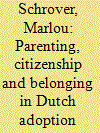

|
|
|
|
|
| Summary/Abstract |
This article tests the use of the concepts ‘politics of belonging’ and ‘intimate citizenship’ for explaining (dis)continuities in intercountry adoption. It focusses on the Netherlands in the period 1900–1995. Adopters, adoption agencies and authorities in the countries of origin and settlement were the main actors. This article shows that adopters were claiming a right to a family, receiving states were granting or withholding rights, and adoption agencies were not only voicing moral claims and following a political agenda, but also a commercial one. In the discourse used in press and Parliament, intercountry adoption was justified and children were ‘freed for adoption’ by redrawing boundaries and hierarchies between cultures and nations, as well as by redefining the importance of ties, (dis)qualifying ‘parents’ and stressing state responsibilities.
|
|
|
|
|
|
|
|
|
|
|
|
|
|
|
|
|
|
|
|
|